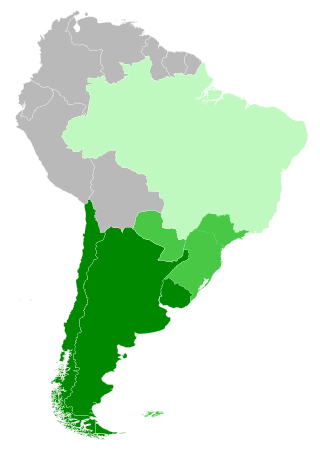
Uruguay, officially the Oriental Republic of Uruguay or the Republic East of the Uruguay, is a country in South America. It shares borders with Argentina to its west and southwest and Brazil to its north and northeast, while bordering the Río de la Plata to the south and the Atlantic Ocean to the southeast. It is part of the Southern Cone region of South America. Uruguay covers an area of approximately 181,034 square kilometers (69,898 sq mi) and has a population of around 3.4 million, of whom nearly 2 million live in the metropolitan area of its capital and largest city, Montevideo.

Montevideo is the capital and largest city of Uruguay. According to the 2011 census, the city proper has a population of 1,319,108 in an area of 201 square kilometers (78 sq mi). Montevideo is situated on the southern coast of the country, on the northeastern bank of the Río de la Plata.

The Southern Cone is a geographical and cultural subregion composed of the southernmost areas of South America, mostly south of the Tropic of Capricorn. Traditionally, it covers Argentina, Chile, and Uruguay, bounded on the west by the Pacific Ocean and on the east by the Atlantic Ocean. In terms of social, economic and political geography, the Southern Cone comprises Argentina, Chile, and Uruguay, and sometimes includes Brazil's four southernmost states. In its broadest definition, taking into account common history and geography, it also includes Paraguay, another Spanish-speaking country.
Latin Americans are the citizens of Latin American countries.

Punta del Este is a seaside city and peninsula on the Atlantic Coast in the Maldonado Department of southeastern Uruguay. Starting as a small town, Punta del Este later became internationally known as a resort for the Latin and North American jet set and tourists. The city has been referred to as "the Monaco of the South", "The Pearl of the Atlantic", "the Hamptons of South America","the Miami Beach of South America", or "the St. Tropez of South America".

Italian Uruguayans are Uruguayan-born citizens who are fully or partially of Italian descent, whose ancestors were Italians who emigrated to Uruguay during the Italian diaspora, or Italian-born people in Uruguay. Outside of Italy, Uruguay has one of the highest percentages of Italians in the world. It is estimated that about 44% of the total population of Uruguay are of Italian descent, corresponding to about 1,500,000 people, while there were around 90,000 Italian citizens in Uruguay.

Bulgarians have been settling in South America as economic emigrants since the late 19th century. Their presence has been documented in Uruguay since 1905, in Argentina since 1906 and in Brazil since the early 20th century.

Paraguay and Uruguay established diplomatic relations on April 6, 1845. Paraguay has an embassy and a consulate-general in Montevideo. Uruguay has an embassy and a consulate-general in Asunción. Paraguay also has an honorary consulate in Punta del Este. Both countries were founding members of the Mercosur, and both are full members of the Rio Group, the Latin Union, the Association of Spanish Language Academies, the Organization of American States, the Organization of Ibero-American States, the Union of South American Nations, the URUPABOL, the Cairns Group and the Group of 77.

Uruguayans are people identified with the country of Uruguay, through citizenship or descent. Uruguay is home to people of different ethnic origins. As a result, many Uruguayans do not equate their nationality with ethnicity, but with citizenship and their allegiance to Uruguay. Colloquially, primarily among other Spanish-speaking Latin American nations, Uruguayans are also referred to as "orientals [as in Easterners]".
Chinese Uruguayans are Uruguayan citizens of Chinese ancestry or are Chinese people residing in Uruguay.
Peruvian Uruguayans are mostly Peruvian-born persons living in Uruguay. There are as well some Uruguayan-born persons of partially or full Peruvian descent.

Immigration to Uruguay began in several millennia BCE with the arrival of different populations from Asia to the Americas through Beringia, according to the most accepted theories, and were slowly populating the Americas. The most recent waves of immigrants started with the arrival of Spaniards in the 16th century, during the colonial period, to what was then known as the Banda Oriental.

Argentine Uruguayans are people born in Argentina who live in Uruguay. In 2010, there were over 10,000 Argentines living in Uruguayan territory.
Americans in Uruguay are mostly persons born in the United States and living in Uruguay. There are as well some Uruguayan-born persons of American descent.
Chilean Uruguayans are people born in Chile who live in Uruguay, or Uruguayan-born people of Chilean descent.
Cuban Uruguayans are people born in Cuba who live in Uruguay, or Uruguayan-born people of Cuban descent. As of 2019, there were 24,485 Cubans living in Uruguay.
Dominican Uruguayans are people born in the Dominican Republic who live in Uruguay, or Uruguayan-born people of Dominican descent.
Bolivian Uruguayans are people born in Bolivia who live in Uruguay or Uruguay-born people of Bolivian descent.
Venezuelan Uruguayans are people born in Venezuela who live in Uruguay, or Uruguayan-born people of Venezuelan descent.

Trump Tower Punta del Este is a 26-story luxury apartment tower in Punta del Este, Uruguay. The project was announced in November 2012, and YY Development Group began construction in January 2014. The tower is named after Donald Trump, and was overseen by his son, Eric Trump. It was originally scheduled for completion in 2016 but has been postponed; construction was held up by legal and funding issues. Progress on the project stopped in October 2019, but its construction was recovered in November 2020, through a trust formed by its owners. The building opened in October 2022.











